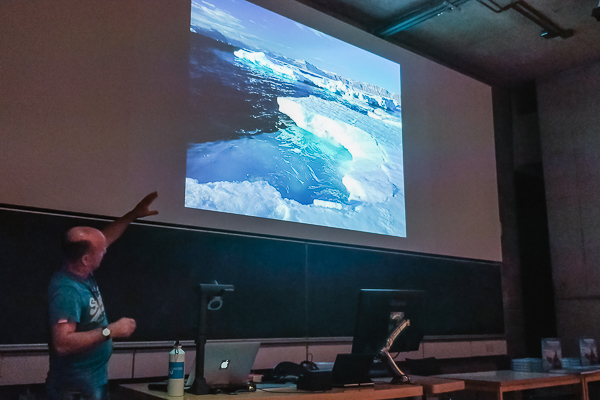“You can throw it away but it doesn’t go away, it just goes somewhere else.” This is how Doug Allan, the freelance wildlife and documentary cameraman, summed up the problem of single-use plastics and their devastating impact on the environment, in an address in Trinity last night.
Allan, twice a recipient of the Wildlife Photographer of the Year award in the underwater category, is perhaps best known for his film work, in a career spanning over 30 years during which he has shot for the BBC, Discovery, National Geographic and many others. He has contributed to series such as The Blue Planet, Planet Earth, Life, Frozen Planet, Ocean Giants and Operation Iceberg. He has earned himself a staggering eight Emmys, four BAFTAs and three honorary doctorates amongst plenty more notable achievements.
Fourth-year earth science student, Meghan Fitzpatrick, realising she wasn’t able to attend a talk Allan is due to give in Belfast tomorrow, decided to chance her arm and email him on a whim. It was a gamble, but one that paid off when he responded in the affirmative. Needing help to promote and run the event she enlisted the groups TCD Plastic Solutions and Enviro Soc and together subsequently Trinity College Dublin Students’ Union (TCDSU). The packed lecture theatre reflected the highly-anticipated visit, with a three-euro ticket fee not a deterrent to a mixed group of students, staff and alumni.
Straight out of a marine biology degree in Stirling, Scotland, Allan started with tales of his early research projects in the Red Sea, explaining that it wasn’t the data or lab work that interested him but instead the practical work in collecting data. As a child he was a keen snorkeler, and in college he became a proficient diver: “All I did really was build one interest on top of another.”
Allan’s association with Sir David Attenborough is well-documented, and he credited the work of Attenborough and his crew with his own decision to pick up a camera. “If David hadn’t turned up you might be talking to someone else”, he offered yesterday, alluding to the well-documented respect and close friendship between the men. With both famous for their work in Antarctica, the time they spent there formed a big part of yesterday’s talk. Attenborough famously once said that “wildlife cameramen don’t come more special than Doug Allan”.
With Allan moving quickly on from personal anecdotes, the presentation soon became educational in nature. It was very factual and everyone left with a new appreciation of the environments on both poles. ”A person wearing winter boots could stand with both feet inside a single footprint of a big [polar] bear”, he declared. Most interesting of all were the powerful stills and footage which accompanied his address. That they were all shot by Allan himself was a measure of Allan’s talent. Most audience questions from the floor came from onlookers in awe of his ability, focused on the stories behind the photos. The presentation featured glorious images of everything from polar bears swimming majestically underwater to a gruesome seal carcass, and a cute penguin whose chest hair resembled a perfect heart shape. Met with laughter and shock, it was certainly a means of getting his point across.
Climate change was a big topic of discussion and a natural progression for the presentation. After emphasising the livelihoods of so many amazing species, Allan then moved on to highlight the impact of human activity on the lives of these species. Allan discussed the devastating concept of positive feedback with ice-shelf retreat, the delicate nature of coral reefs and the negative impact of climate change on the breeding patterns of emperor penguins. “It takes 1000 years to build a coral reef and five years to destroy it”, he asserted.
Ironically, the more ice that melts in the Arctic due to global warming, the easier it is for ships and commercial drilling to access unexplored areas under the ancient ice pack, where there exist vast reserves of fossil fuel. Allan pointed out that humankind simply cannot afford to exploit these reserves if it comes at the cost of melting ice caps. However, the easier it gets, the more viable it becomes for big oil to do just that, causing grave long-term consequences in search of short-term profit.
In search of a new system of economic thought, one based on ”using money with conscious thought about its environment, cultural and social impact”, Allan encouraged students to find out where their money was being invested and work towards change. Referring to the positive impact of student political influence, he pointed out that over 60 universities in the UK have convinced their college boards to divest completely from fossil fuel investment. It wasn’t long before someone proudly piped up that Trinity had also managed to do so at the end of 2016. It has definitely become apparent that the next big movement in the college is towards a single-use plastic free campus. The importance of the issue was brought home as Allan showed graphic images of wildlife trapped in plastic packaging. “It’s a big task, it’s not an easy task but it starts with the individuals”, he insisted. “It needs people like you to push the buttons and tell people in power that we want to do things differently.”







